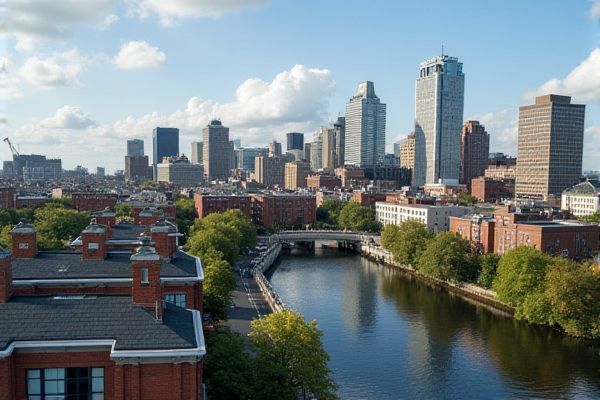
What to know as new resident in Massachusetts: Tax regulations and rates. Weather patterns and seasons. Public transportation systems. Famous local attractions. State-specific driving laws. Cost of living variations. Healthcare facilities and providers. Educational institutions and opportunities. Local cultural traditions. Recycling and waste management policies.
Tax regulations and rates.
As a new resident in Massachusetts, understanding the state's taxation system is crucial. Massachusetts imposes a flat income tax rate of 5%, with an additional 4% surtax on income exceeding $1 million, effective from the 2023 tax year. Depending on your residency status and the duration of your stay, you will need to file either Form 1 if you are a full-year resident, or Form 1-NR/PY for nonresidents or part-year residents. This ensures you comply with the state's requirements and accurately report your income based on your presence in Massachusetts.
Weather patterns and seasons.
Massachusetts has a humid continental climate with cold, snowy winters and warm, humid summers. The state experiences all four seasons, with spring bringing mild and variable temperatures, summer offering warm weather with frequent precipitation, autumn featuring colorful foliage and moderate precipitation, and winter characterized by cold temperatures and significant snowfall, especially in inland areas. For more detailed information, you can visit the Seasons Year website.
Public transportation systems.
The Massachusetts Bay Transportation Authority (MBTA), known locally as "the T," serves as the primary public transportation system in Eastern Massachusetts and parts of Rhode Island. It offers a comprehensive network of subway, bus, Commuter Rail, ferry, and paratransit services. As one of the oldest and most extensive transit systems in the U.S., the [MBTA](https://www.mbta.com/history) plays a crucial role in facilitating daily travel for residents and visitors alike, contributing significantly to the region's mobility and infrastructure development.
Famous local attractions.
Massachusetts offers a wide range of attractions, including historic sites like Plymouth where the Pilgrims landed, the Freedom Trail and Black Heritage Trail in Boston, and the Plimoth Patuxet Museums. Other notable attractions include the Berkshire Hills, Cape Cod National Seashore, the Basketball Hall of Fame, and various museums, zoos, and outdoor recreation areas. For more detailed information, you can explore an extensive list of attractions on the Visit Massachusetts website.
State-specific driving laws.
In Massachusetts, out-of-state drivers are required to register their vehicle if it is used for more than 30 days in a year. College students, in particular, must file a Nonresident Drivers' Statement with the police department in order to avoid fines. For a detailed understanding of these requirements and how they impact drivers from other states, you can refer to the comprehensive coverage provided by CBS News Boston.
Cost of living variations.
The cost of living in Massachusetts is 48% higher than the national average, with housing costs soaring to 112% above the norm. There are significant variations across different cities; for instance, Boston is a striking 47% higher than the national average. However, some cities offer relatively more affordable options; Leominster and Pittsfield are only 14% and 2% higher than the national average, respectively. For a detailed overview and comparison of living costs in Massachusetts, the Cost of Living Calculator provides valuable insights into these disparities.
Healthcare facilities and providers.
If you are seeking healthcare facilities and providers in Massachusetts, you can utilize the Mass.gov resource to locate hospitals, nursing homes, home health care services, and other outpatient services. This ensures that your providers are within your health plan's network and licensed by the appropriate state agencies. For more information, visit their Mass.gov page.
Educational institutions and opportunities.
Massachusetts offers a diverse range of educational institutions, including numerous public and private higher learning establishments, two-year community colleges, and specialized schools like the Massachusetts Maritime Academy. Residents can qualify for resident tuition rates after 12 months of domicile, and programs like MassReconnect and MassEducate provide free or reduced-cost community college education for eligible residents. For more detailed information about these opportunities, you can visit the official website.
Local cultural traditions.
As a new resident in Massachusetts, you should be aware of the diverse local cultural traditions, including traditional arts, music, dance, and crafts, which are supported and documented by the Mass Cultural Council's Folk Arts & Heritage Program, highlighting the state's rich folk culture and community celebrations.
Recycling and waste management policies.
In Massachusetts, new residents should be aware of stringent recycling and waste management policies, including a ban on landfilling organic waste for businesses generating over 0.5 tons per week, a five-cent refundable deposit on certain beverage containers, and strict regulations on the siting, operation, and maintenance of solid waste facilities. For more detailed information on these regulations, individuals are encouraged to visit the Waste Recycling Laws Rules website, which provides comprehensive resources and guidelines ensuring compliance within the state.
